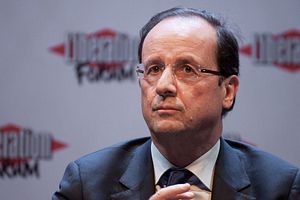As I noted earlier this week, French President Francois Hollande is on a three-nation lightning tour of Southeast Asia – Singapore, Malaysia, and Indonesia – from March 26-29 (See: “France’s Hollande Kicks Off ASEAN Tour With Singapore Visit”).
After being in Singapore during the weekend, Hollande moved on to Malaysia on March 27. In doing so, he became just the second French president to ever visit Malaysia, with the last being Jacques Chirac over a decade ago. Hollande’s visit also occurred during the year where both countries are commemorating the 60th anniversary of their ties.
Though there were other developments on the people-to-people side – from an honor awarded to Malaysian actress Michelle Yeoh to Hollande’s visit to an arts museum – two main areas of focus during the Malaysia leg of his tour were economics and defense. That was no surprise. Both are important economic partners in the context of their respective regions, with France being Malaysia’s fourth largest trading partner within the European Union and Malaysia being France’s fifth largest trading partner within ASEAN. Furthermore, France has been one of the key partners Malaysia has relied on for its defense technology, including its two Scorpene-class submarines (See: Malaysia Eyes Submarine Base Expansion Near South China Sea”).
On economics, the two countries signed six business-to-business memorandums of understanding covering the fields of energy efficiency, solar power generation, and innovation and technology transfer.
Unsurprisingly, it was defense issues that dominated the headlines. As a symbolic demonstration of the importance of the defense relationship, Hollande visited the Royal Malaysia Air Force Base in Subang Jaya to witness a static demonstration of the newly arrived Airbus A400M transport aircraft. Malaysia recently became the first non-NATO country to acquire the aircraft.
That symbolism was balanced with substance. The two countries also discussed potential deals, including the potential sale of Dassault Aviation SA’s Rafale multi-role combat jet which Malaysia is considering as an option. Though France has been pushing hard for Malaysia to acquire the jets – up to 18 for $2 billion according to some media reports – Malaysian officials have not shown a willingness to move forward on this so far.
Following his hour-long meeting with Hollande, Najib, who was formerly defense minister, said that Malaysia was still making its decision but “took note of its (the jet’s) success in other countries.” Hollande, meanwhile, said that France was open to discussing the price and specifications with Malaysia at the appropriate time.
Both leaders also discussed counterterrorism. France and Malaysia have both been the victim of terrorist attacks in recent years, and they are also both members of the U.S.-led Global Coalition to Counter ISIL which convened last week in Washington, D.C. Malaysia has been looking to contribute to international counterterrorism efforts, particularly deradicalization of militants, countering narratives on social media, and encouraging moderation (See: “Malaysia’s New Terror Centers in its Islamic State War”).
Following their meeting, Najib said Malaysia had given France a deradicalization module with a proven 95 percent success rate in rehabilitating militants. He also reiterated Malaysia’s contributions to the ongoing fight against the Islamic State.

































